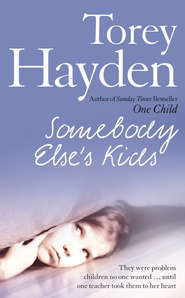По всем вопросам обращайтесь на: info@litportal.ru
(©) 2003-2024.
✖
Just Another Kid: Each was a child no one could reach – until one amazing teacher embraced them all
Настройки чтения
Размер шрифта
Высота строк
Поля
Again she shook her head.
Bringing her hands down, she snuffled back unfallen tears. She groped in her coat pocket for a tissue.
“I’m sure things must be hard for you,” I said quietly. “From all I’ve heard about living with Leslie, you’re under a lot of pressure. Coping must be very difficult in such circumstances.”
“I don’t know what to do.”
“Perhaps I could help you with Leslie,” I said. “If you want, I think I could probably make it a little easier for you.”
She shook her head.
“You don’t want that?”
“It’s not Leslie, it’s me. I just wish I could kill myself.”
Concerned, I regarded her.
“I can’t sleep. I lie in bed and think about how I’m going to do it. I make lists in my head.”
“Lists?”
She shrugged slightly. “Of the people to call. You know, the lawyers and such, the things you’ve got to arrange.”
I didn’t know quite what to say.
“I lie there and think about those things,” she said. Her voice was very soft, almost apologetic. “I’m scared to death of screwing it up. Tom’d never forgive me.”
“I see.”
“I think about it all. And then I go downstairs and I think, I’ll just have one drink to give me courage to do it. But one drink isn’t enough. I’m still too chicken.”
Her facial muscles tensed; the tears reappeared but still did not fall. “And then Tom comes downstairs and he looks at the clock. It’s maybe like 6:30 in the morning. And he says, ‘What a disgusting bitch you’ve turned out to be.’”
Chapter 8 (#ulink_c8819fef-a273-504d-83af-4827f85e5e4a)
I collected Leslie and drove her and her mother home. I was reluctant to let Dr. Taylor drive as I had no idea how much alcohol was still in her system, and I was even more reluctant to leave her to her own devices. The journey was fairly long and took place in virtual silence. The change in location from the classroom to the car had broken the last of our intimacy. I could feel her defenses being put back into place, and I became a stranger again.
At last, I pulled into the long drive and came to a stop in front of the Considynes’ house. It was a magnificent affair, sprawling in all directions, set in a literal forest of trees. But there was little sign of life. Dr. Taylor fumbled at the side of the car door, trying to find the handle to open it.
My mind had been racing during the trip over in an effort to come up with something to say. “Dr. Taylor?”
She did not answer, did not turn toward me, but she paused in her efforts to get out.
“Can I help you in some way?”
No response.
“I know this afternoon has been a pretty dreadful experience and I imagine you never want to see my face again, but I mean it. Is there something I can do?”
“Like what?”
I smiled apologetically. “I’m not sure. Could we perhaps just talk again?”
She nodded very slightly. The car door opened. “Thank you for everything,” she said, her voice barely audible. Then she got out. She opened the back door for Leslie, and I watched as they walked up the drive to the house.
Dr. Taylor didn’t take up my offer to talk. In fact, over the next few days she seemed to studiously avoid me. Tom Considyne brought and picked up Leslie, and I didn’t see Dr. Taylor at all for the rest of the week.
Initially, I was disconcerted. I didn’t know how seriously to take her talk of suicide, but I didn’t necessarily think it should be ignored. On the other hand, I was unsure what I, personally, could do. At the time, it had seemed most important simply to get her to return, because until she was willing to do that, any offer of help from anyone would go unheeded. But if she did return, I didn’t know precisely what I intended to do about her situation. I did make the effort to collect a few brochures on AA and other locally available programs for alcohol treatment, but beyond that, I hadn’t done anything.
However, as time passed, the sense of urgency in the situation diminished. The immediacy of that horrific afternoon in the classroom receded, and ordinary day-to-day life with the children began to take precedence again.
My expectations of Shamie, Shemona and Geraldine were different from what reality was proving to be. I’d never dealt directly with children who had been on intimate terms with serious political strife or guerrilla warfare. It all seemed such a horrendous thing to me that I’d assumed it would somehow permeate every fiber of their beings. I had expected them to exude the tensions of Northern Ireland like breath, so that we would never be free of it. Indeed, I suppose I was as naïve as all those who had spoken to me of the girls before their arrival, because I expected their sad saga to overwhelm the children themselves. In fact, it didn’t. They were, for the most part, very ordinary children, filled with very ordinary concerns. Certainly all three had suffered as a result of their previous circumstances, but they had suffered in the way all children suffer—in bewildered silence. Only their accents and their occasionally strange-sounding phrases reminded us of their foreign origins. Geraldine, alone, brought Belfast directly into conversations. She was undeniably homesick and couldn’t keep from comparing her life here with her life there, but they were commonplace comparisons, of foods or different ways of doing things. They were the kinds of comparisons any homesick child would make. Belfast could have been Buffalo.
As the weeks passed and I grew more familiar with the children as individuals, I found their behavior very, very similar to that of severely abused children. They had that same quiet wariness about them, that same faint air of lost innocence, but they accepted their lives as normal and never raged against what had been stolen from them. Only on brief, incidental occasions did I glimpse the gray, gaunt specter of the abuser.
Geraldine, I discovered, was quite unwilling to mix with the other children on the playground. She stayed completely clear of Carolyn’s kids, which I could understand to a degree, as their ages and handicaps made them fairly unsuited to an eight-year-old’s activities, but she also refused to play with Mariana or Dirkie. Indeed, she didn’t even play alone. Instead, she spent the entire time standing with me or with Carolyn, depending who was on duty, and because she did, so did Shemona. The only way to get the girls to join in was to join in myself.
Geraldine was making a general nuisance of herself one morning when we were out. She was swinging on my arms, hanging on my clothes, stepping on my shoes. Then she was in back of me, arms around my waist, face buried into my down jacket.
“Look over there,” I said. “Joyce has gotten a game going. Why don’t you take Shemona over and see if you can play too?”
“Don’t want to,” Geraldine breathed into my jacket.
“It looks like fun.”
“They’re all babies. I don’t want to play a baby game.”
“Mariana’s over there. It looks like they’re playing Duck, Duck, Goose. If you were there, Mariana would probably choose you.”
Geraldine hugged me tighter. “Shemona wouldn’t like it, would you, Shemona?”
Shemona, standing beside us, looked up but gave no response.
I reached an arm around to disengage Geraldine’s bear hug. “Would it help if I went over there too?”
“Don’t want to, Miss.”
“Why not?”
“Just don’t want to.”
Shemona sat down on the asphalt and began to play with the Velcro fastening on her shoe. Over and over, she undid it and did it up again with an irritating rip. Geraldine pushed her hands into her pockets and stood beside me.
“Are you afraid of the other children?” I asked quietly.
“I’m not afraid of anything,” Geraldine replied, just as quietly.
Then silence. We watched the other children playing. Everyone was over there, including Shamie, and the game was growing exuberant.











